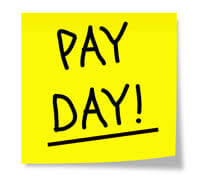What is a payslip?
A payslip is a note that is given to an employee when they have been paid. It displays the amount of pay given to the employee, as well as the tax and insurance is that deducted, if any.
Your payslips can used as proof any earnings to get, the tax you have paid, and any pension contributions you have made. This can be useful, for example, when you are wanting to rent or buy a house, as sometimes you are asked for proof of employment along with tax returns and payslips for proof of the amount of income.
In fact, some personal and unsecured loans require proof of income and a pay-slip from work is usually the most simplest way of showing how much you earn each month. This includes guarantor loans too – in some cases, especially for mortgages, the brokers or lenders require a history of 3 pay-slips to confirm your salary.
You are not always going to receive a payslip if you are:
- Not an employee but are working e.g a contractor, a consultant, a freelancer or a ‘worker’.
- In the police service
- A merchant seaman
- A master or crew member working in share fishing (meaning you are paid by a share in the profits or gross earnings of a fishing vessel)
When do you get a payslip?
It is a requirement that your employer provides you with a payslip. Employers can choose to issue a payslip via electronic means (online, email etc) or by paper, which is the more traditional approach. However, more and more employers are choosing to go electronic for the purpose of ease, accessibility and because it is more environmentally friendly, since there is less paper being used to issue the payslips.
When you start working your employer should tell you how much you will be earning (after tax) and when. For example, the last Friday of the month, last working day of the month or the first day of every month etc.
They should also tell you how you will be paid. In cash, by cheque or by direct bank transfer. So, when you get paid, will align with your payslip. You may receive it a few days or a week or so before, so you know how much you are getting for that month in advance.
What will be shown on my payslip?
On every single statement, there must be the following information contained on it:
- The amount of wages you earn BEFORE any deductions (gross wages)
- Your individual amount of any fixed deduced, eg. Trade union subscriptions.
- The total amount of deductions that apply if you are given a ‘standing statement of fixed deductions’.
- The individual amount of any variable deductions, so things like general tax.
- Net amount of your wages (this refers to the amount you receive after taxes)
- The amount and method of any part-payment of a wage, such as figures separate from a cash payment and the balance credited to a bank account.
The payslip may also include additional information from your employer which they are obliged to provide, for example:
- National insurance number
- Tax codes
- Either an annual or hourly pay rate, so for example it may display £8.80 as the hourly rate.
- Any addition payments such as your overtime, tips or bonuses if applicable – these may be shown in a separate box to your base income and then be totalled up at the end of the slip.
Your employer is always required to also explain any deductions fixed in amount, repayment of a season ticket loan that you have the right to claim back, for example. This may be on the payslip or they can choose to do this in a separate written statement.
Standing statement of fixed deductions
If the person who employs you decides not to set out any fixed deductions on the payslip itself, they must give a standing statement of any fixed deductions.
Therefore, the statement must in every case:
- Be in writing
- Be updated every 12 months (1 year)
- State the amount and when the deduction(s) is/are made
- State the reason, description or purpose for the deduction
- Be issued to you before your first payslip with the fixed deductions
If there are any changes that affect your fixed deductions, the employer must then give you written notice of that change or an amended statement so that you are made aware.
What if there is a problem with my payslip?
If you find that there is a problem with your payslip, you should always speak to your employer first to see if they can sort out the problem themselves, or if you can. If you are a remember of a trade union or have an employee representative, you could ask for their aid in resolving the problem.
If all of the above fails, you may want to make an application to an industrial tribunal.
If the problem is that you have not been paid the full amount of pay, you should check the payslip and contract of employment respectively to see if they can explain why you have not been paid in full.
Know your employee rights by referring to the Gov.uk website. They provide a vast amount of information of everything to do with employee and workers rights, as well as employers rights.
If you want a more detailed overview on your rights as an employee, refer to the Employment Rights Act 1996.




